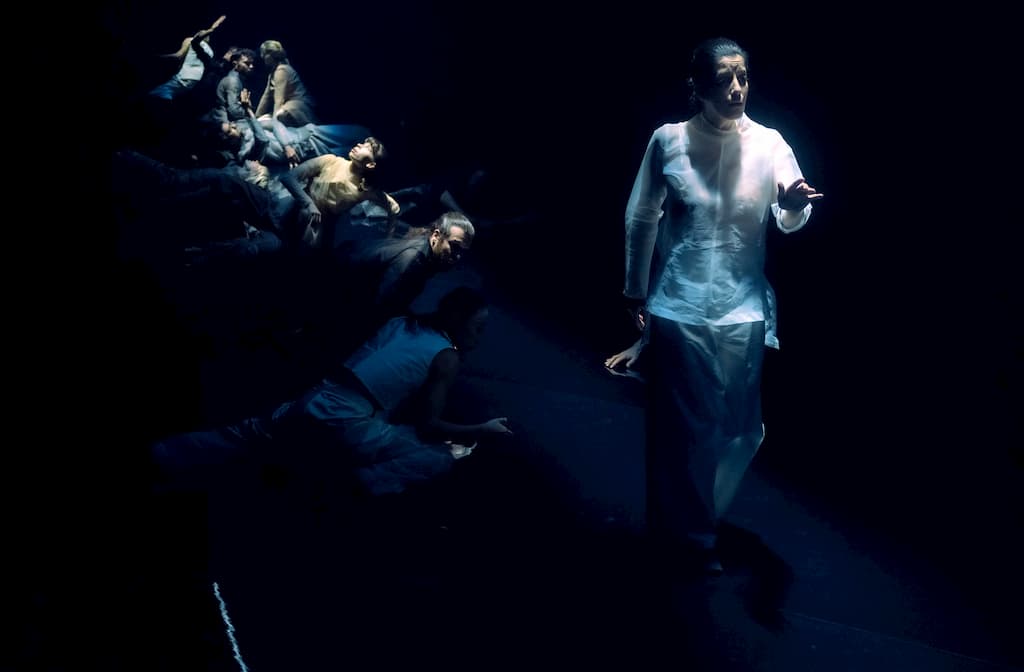
Copyright information:Mikko Suutarinen
In this world premiere, Finnish choreographer Tero Saarinen (1964) pays tribute to the delicate music of compatriot Kaija Saariaho (1952–2023). Soprano Raquel Camarinha, six Tero Saarinen Company dancers and nine musicians from Asko|Schönberg innovatively bring Saariaho’s vibrant sound world to life.
Study for Life revolves around the desire for connection in a fragmented world. Beginning from a dystopian and solitary landscape, the multidisciplinary piece gradually travels towards hope, offering an opportunity to attune to life’s quieter, non-verbal messages.
Blending elements of a concert, sound installation, and dance, the work immerses and merges them into one synesthetic experience where the audience is seated in a 360-degree arrangement around the stage. Both dancers and musicians share the space, moving and gliding through the shifting light that echoes the tonal layers of the music.
In total, the evening includes four of Saariaho’s early compositions (Study for Life (1980), Petals (1988), Lichtbogen (1986), Attente and Parfum de l’instant (2002, from Quatre Instants). Study for Life is a collaboration with Amsterdam-based Asko|Schönberg ensemble. The sound design is by Tuomas Norvio, the scenography by Fabiana Piccioli, Sander Loonen, and costume designer Erika Turunen.
dates
Tue June 24 2025 8:30 PM
Wed June 25 2025 8:30 PM
prices
- default including drink from € 37
- CJP/student/scholar incl. a drink € 17,75
information
-
English
-
1 hour 20 minutes
-
Please note:
tickets in the hall are not placed. Audience is seated in a 360-degree arrangement around the stage.
this performance contains strong flashing lights.
Would you like more background information? Then visit the introduction at 7:45 PM, where journalist Frederike Berntsen will interview the choreographer Tero Saarinen (language: English).
As part of the performance, there’s an introductory sound installation To Water on Foyer Deck 1 by Tuomas Norvio. The installation is supported by Genelec.
Choreographer’s note
'We had been planning a collaborative work with Kaija Saariaho for years. In spring 2023, at Kaija’s request, it was decided that the musical arc of the piece would be built around her first stage work Study for Life. The early work is based on T.S. Eliot’s poem The Hollow Men (1925), which, with its depiction of emotional numbness, disconnection and anti-war themes, remains profoundly relevant even a hundred years after its publication.
Attuning and becoming sensitive to the non-verbal messages of life is something that unites all of us involved in this work. By allowing new sounds and forms to emerge, we can saturate our being with ever more diverse colors. Kaija offered us the opportunity to hear something new, to sense sounds in a new way, and with Study for Life, I wanted to answer this invitation.'
- Tero Saarinen
About Kaija Saariaho
by Joep Stapel
Kaija Saariaho was born in 1952 in Helsinki, where she studied graphic design, piano, musicology, and later composition. In 1980, she continued her education at the Hochschule für Musik in Freiburg, and in 1982 she moved to Paris. There, she met fellow composer and future husband Jean-Baptiste Barrière, with whom she had two children.
Saariaho was initially trained within the confines of postwar modernism, a tradition shaped by the serialism of Pierre Boulez and Karlheinz Stockhausen. To her, it felt like a straitjacket. She found a way out in 1980 during the Darmstadt Summer Courses, where she encountered the music of the French "spectralists" Tristan Murail and Gérard Grisey. These composers used computers to analyze the overtone spectra of sound and based all aspects of their compositions on these findings.
Saariaho went on to study at IRCAM, the renowned institute for electroacoustic music in Paris. She experimented with musique concrète—music based on manipulated recordings of everyday sounds—and began combining electronics with acoustic instruments in live performance settings. Using computer analysis, she developed techniques to let dense sonic textures evolve gradually, prioritizing timbre and harmonic density over melody and rhythm. Saariaho herself described experiencing a form of synaesthesia: she "saw" music in terms of colour, shadow, and light.
In 2000, she composed her first opera, L’Amour de loin, with a libretto by the Lebanese-French writer Amin Maalouf, who would go on to write the librettos for her subsequent operas—with the exception of her final work, Innocence (2018), set to a text by Finnish author Sofi Oksanen. Innocence, widely acclaimed as a masterpiece, premiered in 2021 at the Festival d’Aix-en-Provence, after a delay due to the pandemic, and was staged at Dutch National Opera in Amsterdam in 2023.
In the Netherlands, Saariaho's work has long been met with great admiration. In 2021—after the previous year’s edition had been cancelled—she was the featured composer of the contemporary music festival November Music.










